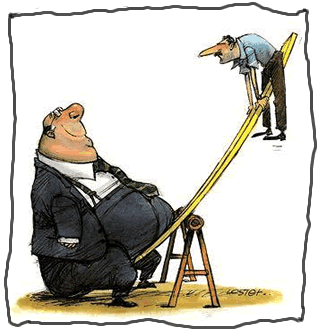@Masonicon: "When I buy sight for the blind, they call me a saint. When I ask why the blind have to buy sight, they call me a Mr. Beast hater."
— Hélder Câmara or something idk I haven't read Helder, O Dom

Here's an interesting piece of trivia: Bill Gates, Steve Jobs and
Bill Joy were born within a year of each other. They would go on to
become leaders in the software industry as heads of Microsoft, Apple,
and Sun Microsystems, respectively. Proponents of equality of
opportunity would hold that their birth dates and their later success
are totally unrelated. However, Malcolm Gladwell asserts that far from a
coincidence, birthdays are integral to explaining how these men rose to
such international prominence.
Outliers: The Story of Success is Gladwell's investigation into
the seemingly-innocuous causal factors behind today's pioneers. As it
turns out, birthdays matter: look at a list of professional North
American hockey players and you will find significantly more born in
January than December. In the case of the NHL, this is because children
born toward the start of the year are more physically developed when
teams start scouting, and are thus more desirable candidates. Younger
players may prove equally capable if given the chance, but why
waste time and resources bringing the runts up to par when you already
have an able squad?
In the case of Gates et al., they had the fortune to develop their
education during a narrow window of time when computer technology was
entering the consumer sphere. Had they been born earlier, they would
have been jaded by the old thinking and failed to seize the opportunity;
later, and they would have missed the entrepreneurial bus. Instead, they
emerged as the vanguard of the digital revolution, blazing the trail on
which the rest of the Information Age has trod.
To be sure, individual effort is also critical. Gates, Jobs and Joy were
smart, creative men willing to plunge into an uncertain future. But in
order to develop their genius, they needed time. A recurring
theme in the book is the idea that mastery of a skill requires 10 000
hours of practice, be it art, music, sports, or computers. Look into the
biography of any virtuoso and find recollections of how he or she was
dedicated to practice or play. Gates et al. emerged as technological
pioneers at early ages because they had been able to devote inordinate
amounts of time to their hobbies. Gates' community pooled together to
buy a computer for his school, and he and his peers found a way to cheat
the time block and program well past allotted hours.
Gladwell presents numerous case studies of how good circumstance has
enabled breakout success stories, and how misfortune has impeded the
gifted. Compare J. Robert Oppenheimer, one of the leading men of the
Manhattan Project, and Christopher Langan, who despite claims as "the
smartest man in America" is virtually invisible to scholarly circles.
Although a certified genius, Langan's impoverished upbringing
complicated his formal education and led him to adopt an adversarial
attitude with postsecondary institutions. Having shunned university, he
lacks academic credentials, and thus, may never see his work published
in any leading scientific journal.
All of this challenges the quintessential American myth that
anyone can go from rags to riches. If a man such as Langan is
unable to find success correlative to his capability, what can we
conclude about equality of opportunity? Success requires hard work, but
also a certain degree of luck: like Aristotle's aristocrat, someone in
the right place to tell the right things to the right people at the
right time.
The core of Gladwell's argument, which remains subversively tacit
throughout most of the book, is that in order to foster greater
individual success, society must strive to provide equality of
condition. He offers a hitherto-overlooked defence of affirmative action
in the education system, explaining that entry scores are irrelevant to
career prospects, and exit scores aren't so critical either: seeking
employment in law, for instance, one needn't have the highest
mark in the class, merely one good enough. Actively targeting
disadvantaged demographics helps them take hold of opportunity otherwise
denied by socioeconomic status. Gladwell discusses the United States'
Knowledge Is Power Program (KIPP), a college-preparatory charter school
network whose attendees are overwhelmingly impoverished African-American
and Latino communities. KIPP boasts high success rates, but its regimen
is not for the faint-of-heart: school hours are longer, summer break is
shorter, and the daily homework leaves little time for family
interaction. It is a gruelling routine: the girl who serves as the
personability of the KIPP chapter goes to bed late each night,
thoroughly exhausted. But in a society unwilling or unable to tackle
domestic inequalities, what other options are there for these children
to escape their disadvantaged position? That is Gladwell's challenge to
the reader.
As Ha Joon Chang colourfully illustrates in 23 Things They Don't
Tell You About Capitalism, it's no good having everyone start at
the same line on the racetrack when some runners are strapped with
cinder blocks. I was at a restaurant the other day when this notion was
reiterated by a group of young women, one of whom I gathered to be
either a teacher or teacher's assistant. She was talking about a game
conducted in class to educate about gambling: students were given poker
chips in uneven distribution to be used at their discretion for
activities I didn't catch. At lunch they would be cashed in for food.
Understandably, those with fewer chips were much less willing to risk
what they had. So it is the same in society at large, with chips
translated into economic and social advantage; lack of a social safety
net discourages citizens from taking risks lest they lose their life
savings. Yes, they have equal opportunity, but social and structural
circumstances prevent them from acting on it.
Providing everyone everything they could possibly use to advance their
condition is a utopian goal, and will almost certainly never be
achieved. Nonetheless, if we hold that all humans are equally deserving
of a prosperous future, we must strive to level the playing field as
much as possible. After all, who knows how many entrepreneurs are simply
waiting for their chance to shine?
Debunking the American Dream by @Thorvald (El Thorvaldo)
Originally published as a DeviantArt journal in March 2013, this is a loose synopsis of Malcolm Gladwell's 2008 book Outliers: The Story of Success and its central argument that if we want more people to succeed in the world, we need to give them the tools upfront. Back in the early 2010s, I'd tried to stagger the typical meme journals and status updates with op-eds written off-the-cuff that I didn't feel quite qualified for 'proper' submissions. The immediate inspiration for this was the conversation recounted in the second-last paragraph.
RIP whatever description I'd made for Buzzly.
Comments & Critiques (2)
Preferred comment/critique type for this content: Any Kind



the greed of corporate America allows American dream to be just a myth